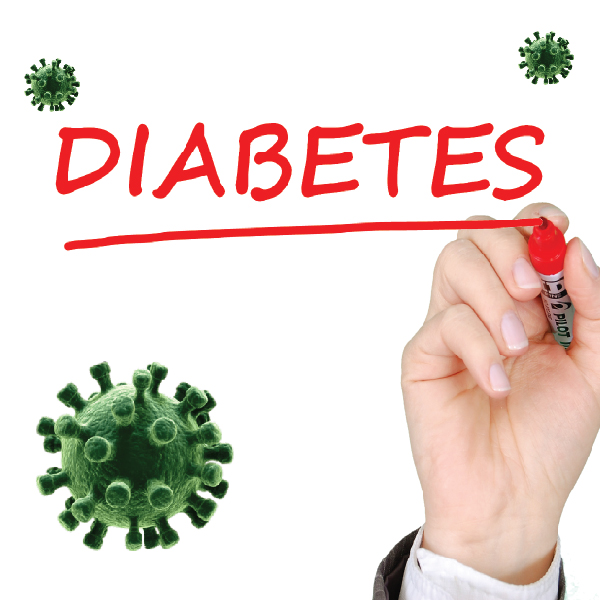
Diabetes and Coronavirus (COVID-19)
Dr Sanjay Kalra
President of the Endocrine Society of India
We are all in the midst of a COVID-19 pandemic. Diabetes has been found to be apoor prognostic factor for COVID-19 infected people, but the reality is much deeper, diabetes has a multifaceted and bidirectional link with COVID-19.
Uncontrolled diabetes is a condition of impaired immunity. In an individual with poorly controlled diabetes, immunity may be impaired increasing susceptibility towards COVID-19 infections and worse outcomes if the person gets infected. Hence, diabetes can be considered a prognostic factor in COVID-19 infections.
Unfortunately, diabetes is considered as a tool for triage in many health systems in the world. It is important to counsel everybody involved that diabetes is a heterogeneous condition. Not everyone with diabetes will have poor outcomes. Certain factors are at play here including;
- Duration of diabetes
- Degree of hyperglycemia
- Presence or absence of other chronic complications and acute comorbidities
So, diabetes per se should not be viewed as a tool for triage. In fact it should be considered as a tool for improvement and achieving optimal targets. In this case, the target is recovery from COVID-19 infections.
How to manage diabetes
Achieve and maintain euglycemia through lifestyle and appropriate drugs
Not every dysglycemia is diabetes, many people have stress hyperglycemia which needs to be identified and treated.
Glucovigilance: Health care professionals shouldbe very vigilant regarding the screening, diagnosis, management, and monitoring of dysglycemia
Don’t ignore other endocrine glands involved in critical conditions; adrenal insufficiency and thyroid syndrome
Adrenal insufficiency is quite common in ICU settings, presents as ‘Koala Bear syndrome,’ and health care personnel should work in teams including endocrinologists to identify and treat these endocrinal insufficiencies.
Health care team’s message to patients
Those who are not infected and those in confinement/lockdown
- Take care of yourselves
- Stock the necessary drugs and ancillarysupplies
- Find and follow healthy nutrition choices and physical activity regimens (which can be done inside home)
- Don’t go out
- Remain stress free, because stress will increase glucose levels
- Patients who are asymptomatic, infected with COVID-19
- Take very good care of yourself
- Follow optimal healthy lifestyle
- Do not go overboard with lifestyle change; if you have never exercised in the past, this is not a good time to start intensive exercise; or if you have never followed dietary restrictions, this is not a good time to go for carbohydrate restrictions
- Optimize your glucose control. If you are well controlled on a particular oral antidiabetic drug, continue the same. If your glucose control is poor, and you need intensification it is better to shift to insulin
- Ensure that you are able to monitor glucose levels. Ensure that you know correct insulin injection technique and disposal techniques while using insulin. All the injectable are of biohazardous quality and should be disposed of very carefully
Symptomatic COVID-19 patients
You need to be hospitalized
You may need help from other health care personnel who might be an internist, intensivist or an infectious disease expert.
Follow their advice, manage optimal glucose levels. If glucose levels are very good, continue the same regimen. If glucose not controlled, an intensive insulin regimen may be needed.
Related FAQs
Everything You need to know about Outbreak of Novel Corona virus Infection in china
Coronavirus in India: Symptoms, Cases and Latest Updates
WHO declares Global Health Emergency -India’s first case of Coronavirus in Kerala
WHO Declares The Outbreak Of The Coronavirus As A Pandemic
COVID-19 or Coronavirus Declared as A Pandemic
Difference between Quarantine, Isolation and Social Distancing
101 With Hantavirus: Causes, Symptoms And Treatment
India Under Quarantine: Can It Block The Virus Progress?
British Prime Minister Boris Johnson Diagnosed with COVID 19
Can Coronavirus Risk Increase In Diabetic Patient
Diabetes and Coronavirus (COVID-19)
Coronavirus-Diabetics are more vulnerable By Dr. Manoj Chawla
Prevention from Coronavirus Infections
Coronavirus- Telemedicine for Diabetes patients
Coronavirus: Is India In Stage 3?
Should I Get Tested For Coronavirus?
COVID-19: The Impact On Human Immune System
COVID-19 in heart and Blood Pressure patient
COVID-19- Update for Heart and Blood Pressure patient
Coronavirus Pandemic: Current situation
Coronavirus And Skin Problems: Things You Must Know
COVID 19 And Kidney: Everything You Should Know
Corona Lockdown Extended To 3rd May 2020: Know Why
Covid-19: How To Stay Safe If You Have Diabetes
All That You Should Know About COVID-19 Or Coronavirus
Diabetes And Covid-19: Keep Calm And Stay Safe
Covid-19 Impact On Diabetes Patients: Things To Keep In Mind
Telemedicine: The Safest Mode Of Doctor-Patient Interaction During Covid-19
Everything you need to know about Russian Sputnik V Vaccine
Know the Difference Between Viral Fever and Coronavirus
New 'Double Mutant' Strain Of Covid-19 Detected In India
Will India See A Third Wave Of COVID -19?
Why is COVID Vaccination Important in India?
What are chances of Reinfection of COVID 19 in India ?
Are Children at Risk of Omicron?
Corona- Delta and Delta Plus Variants
Everything To Know About The Omicron Variant
Symptoms and Severity of Omicron: BA.4 and BA.5 | Medtalks
Another Milestone Reached: US Successfully Developers Covid Vaccine For Babies and Toddlers
Indian researchers find a new way to combat Covid-19
Covid-19 Infection Provides Protection against Reinfection for Roughly 10 Months
